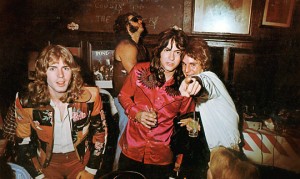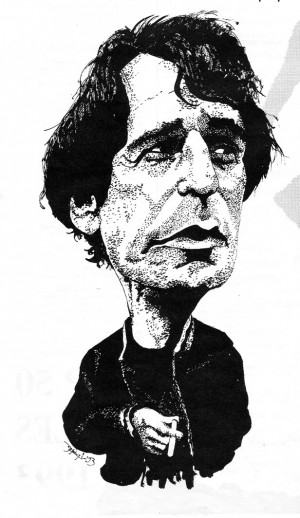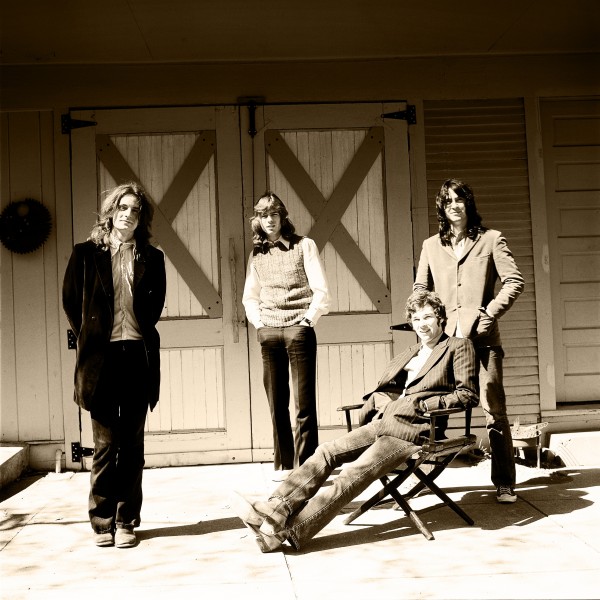BIG STAR: NOTHING CAN HURT ME is a feature-length documentary about legendary Memphis band Big Star. While mainstream success eluded them, Big Star’s three albums have become critically lauded touchstones of the rock music canon. A seminal band in the history of alternative music, Big Star has been cited as an influence by artists including REM, The Replacements, Belle & Sebastian, Elliot Smith and Flaming Lips, to name just a few. With never-before-seen footage and photos of the band, in-depth interviews and a rousing musical tribute by the bands they inspired, BIG STAR: NOTHING CAN HURT ME is a story of artistic and musical salvation. BIG STAR: NOTHING CAN HURT ME will premiere in NYC on Saturday, November 10th at 9:45pm at the SVA Theater (333 West 23rd St) as part of the DOC NYC Film Festival. Jody Stephens (last remaining member of Big Star) and John Fry (Ardent Studios founder and Big Star engineer) will both be in attendance at the screening and will participate in a Q&A following the screening along with the filmmakers. MORE
RELATED: It has been said that the genre of power pop — frail white man-boys with cherry guitars reinvigorating the harmonic convergence of the Beatles, the Beach Boys and the Byrds with the caffeinated rush of youth — is the revenge of the nerds. Big Star pretty much invented the form, which explains the worshipful altars erected to the band in the bedrooms of lonely, disenfranchised melody-makers from Los Angeles to London and points in between.
Though they never came close to fame or fortune in their time, the band continues to hold a sacred place in the cosmology of pure pop, a glittering constellation that remains invisible to the naked mainstream eye. Succeeding  generations of pop philosophers and aspiring rock Mozarts pore over the group’s music like biblical scholars hunched over the Dead Sea Scrolls, plumbing the depths of the band’s shadowy history, searching for meaning in Big Star’s immaculate conception and stillborn death.
generations of pop philosophers and aspiring rock Mozarts pore over the group’s music like biblical scholars hunched over the Dead Sea Scrolls, plumbing the depths of the band’s shadowy history, searching for meaning in Big Star’s immaculate conception and stillborn death.
Big Star was the sound of four Memphis boys caught in the vortex of a time warp, reinterpreting the jangling, three-minute Brit-pop odes to love, youth and the loss of both that framed their formative years, the mid-’60s. Just one problem: It was the early ’70s. They were out of fashion and out of time. Within the band, this disconnect with the pop marketplace would lead to bitter disillusionment, self-destruction and death. But that same damning obscurity would nurture their mythology and become Big Star’s greatest ally, a formaldehyde that would preserve the band’s three full-length albums — No. 1 Record, Radio City and Sister Lovers/Third — as perfect specimens of classic guitar pop. That Big Star’s recorded legacy would go on to inspire countless alternative acts is one of pop history’s cruelest ironies — everyone from R.E.M. to the Replacements to Elliott Smith would come to see Big Star as the great missing link between the ’60s and the ’70s and beyond.
There is a dreamy, pre-Raphaelite aura that surrounds the legend of Big Star. Like the doomed, tender-aged beauties in Jeffrey Eugenides’ novel The Virgin Suicides, the tragic career of Big Star would unravel in the autumnal Sunday afternoon sunlight of the early 1970s. The band’s sound and vision hinged on the contrasting sensibilities of songwriters Alex Chilton and Chris Bell. In the gospel of Big Star, Bell is the sacrificial lamb–fragile, doe-eyed and marked for an early death. Chilton is the prodigal son, returning to Memphis after traveling the world, having tasted the bacchanalian pleasures of teen stardom with the Box Tops in the 1960s.
Where Bell was precious and naive, Chilton was nervy and sardonic, but the band’s steady downward spiral would set him on the dark path of personal disintegration — booze, pills, violence and attempted suicide. Years later, he would reinvent himself as an irascible iconoclast and semi-ironic interpreter of obscure soul, R&B and Italian rock ‘n’ roll. Drummer Jody Stephens, the wide-eyed innocent of the group, and bassist Andy Hummel, the sly-grinning sphinx with the glam-rock hair, were the shepherds in the manger, midwives to the miracle birth. In the aftermath of Big Star’s collapse, Stephens would become a born-again Christian, and Hummel would go on to design jet fighters for the military, anonymous and happy behind the wall of secrecy his job would require. — JONATHAN VALANIA
 PREVIOUSLY: It’s roughly five years ago and I’m heading over to Alex Chilton’s house, a charming Creole cottage of Civil War vintage he’s in the midst of restoring. Chilton is a forbidding totem of American music with a formidable pedigree: white soul prodigy; guiding light of Big Star; progenitor of power-pop purity, pill-addled punk and swampy garage blooze; indie’s aging princeling of white failure. He’s a musician’s musician, and each entry on his resume has spun off countless imitators and innovators.
PREVIOUSLY: It’s roughly five years ago and I’m heading over to Alex Chilton’s house, a charming Creole cottage of Civil War vintage he’s in the midst of restoring. Chilton is a forbidding totem of American music with a formidable pedigree: white soul prodigy; guiding light of Big Star; progenitor of power-pop purity, pill-addled punk and swampy garage blooze; indie’s aging princeling of white failure. He’s a musician’s musician, and each entry on his resume has spun off countless imitators and innovators.
He got his house for a song, he tells me, because it’s located in one of the Big Easy’s more depleted neighborhoods. He’d warned me in advance that cab drivers were reluctant to venture there during the day and wouldn’t even consider it after dark.
As the cab slows at a stop sign, two men in tracksuits approach and the driver waves them off, slamming the locks down and rolling up the windows. I see the suspicion in his eyes as he shoots daggers at me in the rearview mirror. What business would a white boy have here other than scoring drugs?
“Why are you going here?” he demands.
“I’m going to visit Alex Chilton. Do you know of him?”
The cabbie ignores me. As the sun dips below the skyline, I begin to wonder how I’m going to get back to my hotel.
“Will you come back and get me later on?” I ask.
“Hell no!”
When we finally get to Chilton’s house, it looks like a beached tugboat in the weeds. Bars cover the doors and windows. Once inside I tell Chilton about the cabbie’s uneasiness.
“Well, one of them did get shot down the street a month ago,” he says straight-faced, before turning indignant, adding, “But it’s broad daylight! What a pussy!”
Chilton is the only white person in the neighborhood, he confirms, though that could soon change. A Caucasian couple is looking to buy the place across the street.
“There goes the neighborhood,” he deadpans. “I’ve always lived in black neighborhoods. I’ve always related to black people more than white people. If I lived in a white neighborhood, all my neighbors would be washing their BMWs and tending to the garden, and I can’t really relate to that.”
Chilton said something else to me that day that would become evident in the wake of the recent flood and the diaspora that followed: “In the South they don’t care how close the black man gets as long as he doesn’t get too big. In the North they don’t care how big the black man gets as long as he doesn’t get too close.” MORE

